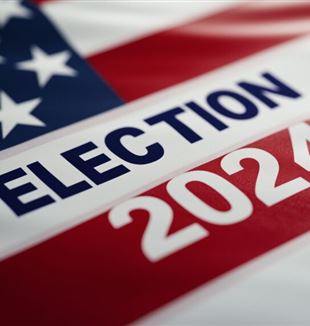
The Paradox of Being a Christian Citizen
“A judgment requires that we value the Truth above all else, which necessitates staking a claim on the political and policy questions of the day.”Despite the certainty and insistence amongst us that each aspect of reality can be looked at and judged according to the Christian gaze, politics remains a black hole, impenetrable and crushing. Every four years, our communities host events in preparation for the presidential election and we fumble to try to identify some kind of key that allows us to enter confidently into the political fray and discern how to cast our ballots. But election cycle after election cycle, the political questions in front of us never become any easier to answer. Why does politics remain so difficult to engage with, both personally and within our communities?
Being a Christian means being in the world, but not of the world. It is, by its nature, paradoxical. Our political life, therefore, is also a paradox. We desire a transcendent politics, the possibility that politics can become as Fr. Giussani described it, “the highest expression of culture,” but the reality falls short. Instead of a civic life that aims at truth, justice, fairness, and the common good, American politics values power, efficiency, cost-effectiveness, and positive polling numbers. Our political reality becomes ripe for technocratic solutions rather than policies that foster human flourishing.
The paradox continues. We know that Christ is our hope, but yet we are still called to get our hands dirty in quotidian policy issues. As Davide Prosperi wrote in Culture: to be for Christ, “our ideal is to be for Christ, which means (we must) throw ourselves into the fray with a judgment that is determined only by our relationship with Christ lived in the Christian community.” To be engaged in politics requires that we commit ourselves to risking speaking the truth, valuing a judgment more than dialogue.
In another tension, as Christians we must grapple with the desire that politics be oriented towards the common good while acknowledging that we live in an extremely polarized and fractured world. In many ways, our electoral systems foster this polarization. Everything from social media echo chambers, to our nomination system, to the entrenchment of our two-party system, to the role of money in politics contribute to a deep divide amongst our citizenry that is difficult to overcome.
Finally, we must reconcile the fact that we value subsidiarity, but all politics seems national. Subsidiarity is the Catholic Social Teaching principle that encourages Christians to deal with issues at the lowest possible level. Problems of education, accompanying the sick, recognizing the dignity of workers, and a myriad of other policy questions may indeed require national attention, but also should place demands of members of the immediate community to deal with issues on a personal, rather than abstract, level. Subsidiarity is impossible to accomplish when we reduce our focus to the presidential election and Supreme Court nominations. At the very least, it means we need to consider down ballot races and local elections as having the same, if not greater import, as national races.
All of these paradoxes, as vexing as they may be, offer opportunities to reconsider our political life, moving beyond questions of who we vote for (though important) to what kind of political contributions we can make.
As Fr. Giussani describes in From Utopia to Presence, our presence must be defined by a positive contribution, it cannot be merely reactionary. This is counter-cultural, as today’s political landscape is defined almost entirely by reactions. Our unity, rooted exclusively in Christ, can become a beacon of hope in a divided world. The work that we do in School of Community, our commitment to our fraternity groups, our charitable works, and our cultural initiatives all have the possibility of being this Presence. The more we plumb the depth of the great Source of our unity, the greater our contribution can be.
Engaging with these political paradoxes also opens up questions that ought to be a consistent work and not just a provocation every four years. What is the common good and what would it look like as a political reality? What is the ideal we are striving for, from our local realities to the national level? What are the specific contours of the common good as viewed through the lens of important policy concerns, from taxes to protecting the sanctity of life?
In order to answer these questions, we must commit ourselves to the hard work of developing a common judgment. In Culture: to be for Christ, Prosperi describes a common judgment not as consensus, but as a shared recognition of Christ present. Perhaps we will not all vote the same way, or favor the same policies, but what can we affirm together?
This effort of elucidating a common judgment also carries a possible correction within it. A judgment requires that we value the Truth above all else, which necessitates staking a claim on the political and policy questions of the day. There can be a temptation to reduce a judgment on current events to merely an opportunity to “grow in self-awareness” or to form a “personal position.” For example, we might consider the complex issue of immigration only to conclude that ultimately it reveals our own need for both belonging and fairness. While certainly this is true, we need to push ourselves to consider the actual consequences of political choices as part of our effort of judging.
As we once again fill out our ballots this election day, let us consider what our political contribution will be once we leave the voting booth and how this contribution reflects our belonging to Christ.